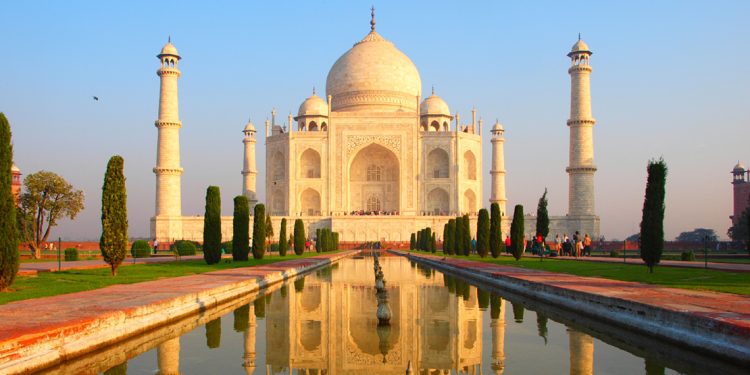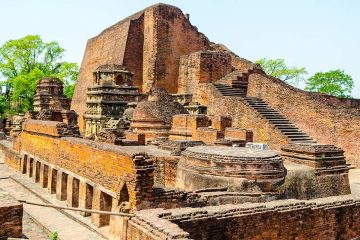
Inside and Out, These Buildings are Fascinatingly Beautiful
India has a long and fascinating history that stretches back many centuries and is reflected in the imposing forts, elegant arches, ancient temples and other impressive buildings throughout the country.
Important historical sites make for some of the best places to visit in India, giving you a glimpse into the past of this diverse, ancient and intriguing place. Here are some of the best architectural buildings in India. If you can work them all into your trip itinerary, you won’t be disappointed!
The Taj Mahal, Agra
Obviously. The Taj Mahal is the ultimate example of historic Indian architecture — a true Wonder of the World — and is one of the most popular places to see in India. It was built by Shah Jahan to house the tomb of his favorite wife, Mumtaz Mahal.
You’ve seen hundreds of photos of this Mughal beauty, built entirely in white marble, but your jaw will still drop when you see it in real life because it’s so huge and perfect that it doesn’t look real.
When you get up close you’ll be even further spellbound — it’s just so ridiculously detailed. Every square inch is carved with delicate reliefs and intricate inlays of semi-precious stones. Plus, it’s incredibly symmetrical — so mathematically perfect that it’s hard to believe it was built by human hands way back in the 1600s.
While your kids may not be keen on visiting every historic building on this list, the Taj Mahal is a must when it comes to things to do in India with kids.
Humayun’s Tomb, Delhi
This stunning building was the first garden tomb in India that was built in the Mughal style of architecture. The elegant arches, the soaring domes and the reddish hue of the facade make it truly striking, especially in the bright Indian sunshine.
It is known as the “Mini Taj” as it looks a little bit like a rosy-hued version of the famous huge white tomb. However, what many people don’t know is that Humayun’s Tomb was actually built before the Taj Mahal and it inspired the layout. It was built in the 1500s and was the first structure in the world to use red sandstone on such a scale.
When booking gay tours in Scandinavia, you're booking a vacation that is safe and LGBTQ+ inclusive. Here are some top destinations to check out.
Meenakshi Temple, Tamil Nadu
This incredibly intricate temple was constructed in the holy city of Madurai in the sixth century BC. It is considered one of the most impressive masterpieces of Dravidian architecture and is a must-visit when it comes to India destinations. The legend is that the temple was completely destroyed by Muslim raiders in the 14th century and was painstakingly restored in the 16th century by Nayak rulers.
As you explore this huge temple complex, you’ll see intricately carved figurines and sculptures from Indian mythology throughout the various halls. Also, be sure to visit the incredible hall of a thousand pillars, each built from a single granite rock and producing a different musical note when tapped.
Nalanda, Bihar
Although these structures are in ruins now, they used to be a university that was a thriving center of learning and attracted students from as far away as Korea, China and Tibet. The university operated from the seventh century BCE to 1200 CE and used to feature classrooms, meditation halls, dormitories, temples and more.
When it was at its peak, there were over 10,000 students living in the dormitories and 2,000 teachers. The greatest minds of the time gathered here to discuss religion and philosophy and learn from each other.
Amer Fort, Jaipur
Perched high on a hill above the city of Jaipur, Amer Fort (also known as Amber Fort) was constructed in 1592. The red and white sandstone structure still stands as a grand example of ancient architecture in India. It is an interesting mix of Hindu and Rajput architecture, with Muslim and Hindu ornamentation.
Be sure to note the impressive carvings on the ceiling and the walls of this fort — they feature depictions of ancient hunting styles, important rulers and much more. Also, don’t miss the Sheesh Mahal (Mirror Palace) section of the fort. There are so many mirrors that it is said if you light two candles they will look like thousands of stars.
Nalanda, Bihar Although these structures are in ruins now, they used to be a university that was a thriving center of learning and attracted students from as...
Tawang Monastery, Arunachal Pradesh
This impressive building is historically significant because it is the largest monastery in India and the second largest in the world. It was constructed in 1680 by the fifth Dalai Lama and it is located on a stunning perch, 10,000 feet above the Tawang River Valley and the nearby mountains.
You can marvel at this enormous monastery complex for hours, as there are so many beautiful details to admire. Plus, don’t miss the impressive 18-foot-high image of the Buddha and the huge library featuring ancient and rare scriptures.
Qutub Minar, Delhi
Constructed in the early 13th century, the Qutub Minar is the tallest minaret anywhere on Earth that is made completely out of bricks. It was constructed by Qutb al-Din Aibak, founder of the Delhi Sultanate. They were the Muslims who ruled most parts of Northern India at the time — the predecessors of the Mughals.
This towering 240-foot-tall structure is made from thousands of bricks and each brick is covered in detailed iron carvings featuring verses from the Quran — pretty impressive!
Be sure to visit these historic treasures on your trip to India!
